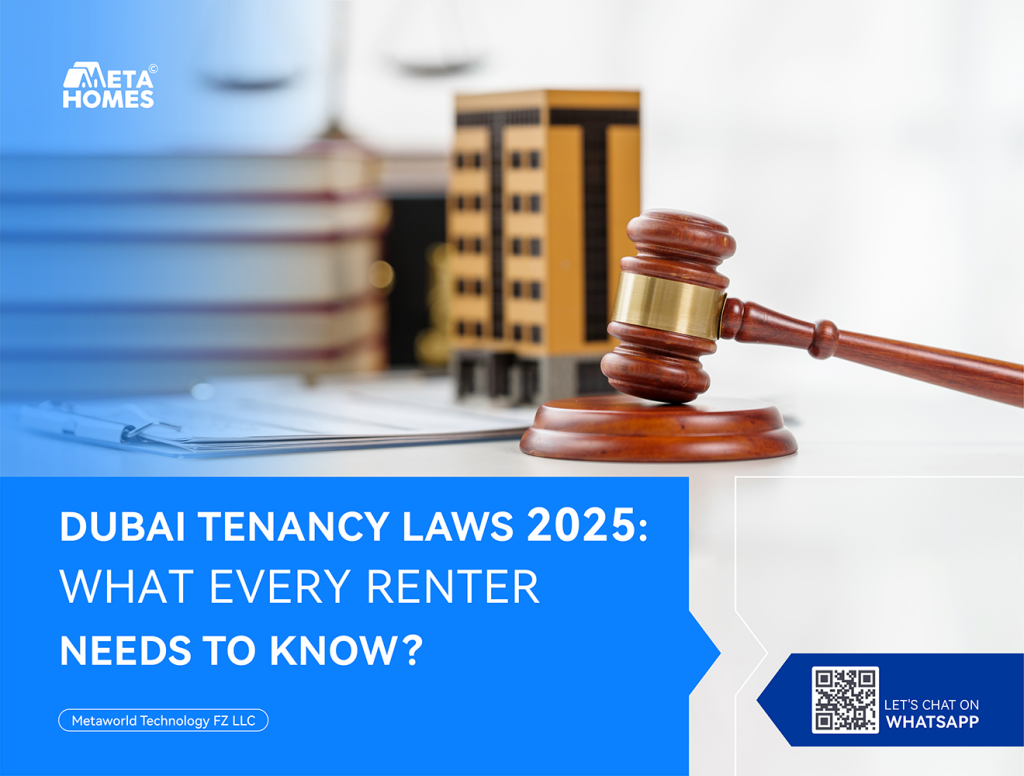
Renting a home in Dubai comes with its own set of rules and responsibilities. Whether you’re a first-time tenant or have been living in the city for years, understanding the tenancy laws is essential. From how your rent is calculated to who handles repairs, the Real Estate Regulatory Agency (RERA) has clear guidelines to protect both tenants and landlords. But before you sign your tenancy contract in Dubai, it’s essential to understand the latest Dubai tenancy laws. These laws help ensure fair treatment, prevent disputes, and make renting a smoother process. Knowing your rights and obligations as a tenant can save you time, money, and stress—especially in a fast-moving rental market like Dubai.
1. Who Regulates Rental Laws in Dubai?
The Real Estate Regulatory Agency (RERA) is the arm of the Dubai Land Department that sets and enforces all tenancy regulations. Established to balance tenant and landlord interests, RERA oversees:
- Law No. (26) of 2007, which lays out the basic framework for landlord‑tenant relationships.
- Law No. (33) of 2008, which amends and clarifies aspects of Law 26/2007.
- Decree No. (26) of 2013, creating the Rental Disputes Settlement Centre (RDC) to handle conflicts.
- Decree No. (43) of 2013, governing permissible rent increases.
Together, these statutes form the backbone of Dubai tenancy laws. They ensure that landlords can protect their properties and that tenants enjoy fair, transparent terms. Always ask to see the law numbers cited in your tenancy contract—it’s your first line of defense.
2. Registering Your Lease (The Importance of Ejari)
No tenancy contract is official in Dubai until it’s registered with Ejari, RERA’s online system. Here’s why Ejari plays a crucial role in renter rights in Dubai:
- Legal Recognition
Ejari registration makes your lease legally binding on both parties. Without it, you can’t enforce your contract or file a dispute.
- Utility Connections & Visas
DEWA, Etisalat, and Du all require Ejari as proof of address before setting up services. If you’re an expat, you also need Ejari to process your residence visa.
- Avoiding Double-Leasing
Ejari prevents two tenants from holding leases on the same unit at once.
- Streamlined Disputes
When you register, your contract details—rent, term, deposit—are stored centrally, making dispute resolution smoother.
How to Register: The landlord or their agent submits your signed contract, copies of passports/Emirates IDs, title deed or developer’s authorization, and a copy of the landlord’s Emirates ID. The current fee is AED 195, paid by either party as agreed.
3. Key Terms in Your Tenancy Contract
Reading your tenancy contract carefully can save headaches later. Here are the must-know clauses:
- Lease Term: Most contracts run for one year, renewable unless either party gives notice.
- Rent Amount & Payment Schedule: Monthly, quarterly, or yearly—make sure dates and currency are clear.
- Security Deposit: Usually 5–10% of annual rent, refundable subject to move‑out inspection.
- Maintenance Responsibilities: Define who handles repairs—major (landlord) vs. minor (tenant).
- Early Termination Clause: If present, spells out penalties or notice required to exit early.
- Notice Periods: How much advance notice you or the landlord must give to amend, renew, or end the lease.
Under Article 6 of Law 26/2007, if you stay on past the expiry date without objection, your lease automatically renews for the same term on identical terms—so don’t assume it ends unless you or the landlord act.
4. Amending Your Lease: Changes & Extensions
Life changes, and so might your lease. Article 14 of the RERA tenancy law requires anyone wishing to amend rent, term, or other clauses to notify the other party at least 90 days before the contract ends. This 3‑month window gives both sides time to negotiate:
- Rent Adjustments: Agree on a new figure or stick to the old one.
- Term Extensions: You might extend to two-year leases if both parties prefer.
- Clause Modifications: Add or remove furniture provisions, pet permissions, or maintenance splits.
Once you’ve agreed, register the amended contract again through Ejari. Otherwise, the old terms remain in force—even if you have a signed side letter.
5. Ending Your Lease (Termination & Vacating)
Knowing how to properly terminate your lease prevents disputes:
5.1 Early Termination
No RERA law lets you break your lease early unless your tenancy contract includes an early-exit clause. If it does, follow it exactly, often involving a notice period and/or an exit fee. If no clause exists, the landlord can demand full rent due until expiry or negotiate a settlement.
5.2 Notice Period After Expiry
Under Law 33/2008, tenants no longer must give 90 days’ notice to vacate at contract end. However, if your contract specifies a different notice (e.g., 30 or 60 days), you must comply or face a penalty. Always check your signed terms.
5.3 Security Deposit Refund
Upon vacating, the landlord has 30 days to return your deposit, minus reasonable deductions for damage beyond normal wear and tear. Photograph every corner on move-in and move-out to support your case if deductions seem unfair.
6. Grounds for Eviction
Renting in Dubai feels secure, yet landlords can terminate your tenancy under clear conditions (Article 25, Law 26 of 2007).
- Non‑payment of Rent: If you miss a payment and fail to pay within 30 days of written notice.
- Unauthorized Sublease: Letting someone else occupy without written approval.
- Illegal or Immoral Use: Using the unit for unapproved business or unlawful acts.
- Property Damage: Causing harm that threatens safety or value.
- Change of Use: Running a factory out of your home, for instance.
- Contract Breach: Failing to rectify other breaches within 30 days of notice.
For commercial leases, eviction can follow 30 consecutive days of shuttered operations without a valid reason. And if the government requires demolition or major redevelopment, eviction can occur with proper notice.
For post-expiry eviction—say the landlord wants to sell, renovate, or occupy themselves—they must issue 12 months’ written notice by registered mail or public notary asking you to leave at term’s end.
7. Rent Increases & Fair Market Value
Unexpected rent hikes cause the most stress for renters. Here’s how rental laws handle increases:
7.1 Fixed-Term Protection
Article 9 of Law 26/2007 ensures your rent cannot change during an initial two-year term unless you agree otherwise.
7.2 90-Day Notice
As with amendments, landlords need 90 days’ advance written notice if they wish to increase rent at renewal.
7.3 Rent Caps
Decree 43/2013 caps annual increases based on the difference between your current rent and the average market rate:
| Difference from Market Rate | Max Annual Increase |
|---|---|
| Up to 10% below | 0% |
| 11–20% below | 5% |
| 21–30% below | 10% |
| 31–40% below | 15% |
| More than 40% below | 20% |
RERA provides an online rental index calculator to check allowable increases. If you and your landlord can’t agree, you may file a dispute with the Rental Disputes Settlement Centre.
8. Maintenance & Repair Responsibilities
Clear maintenance rules prevent the “he said, she said” scenarios:
Tenant Duties (Article 19)
- Pay rent on the due date.
- Use the property only for its intended purpose.
- Handle minor fixes—often those under AED 500 for apartments or AED 1,000 for villas—if your contract stipulates.
- Get landlord permission before painting or making structural changes.
Landlord Duties (Articles 15–17)
- Hand over a fit-for-purpose property, at lease start.
- Conduct major repairs and restore safety after wear and tear.
- Not alter the property in ways that prevent full enjoyment.
- Provide required permits for any landlord‑initiated renovations.
Always record maintenance requests in writing or via official portals (some communities use service apps), so there’s proof if disputes arise.
9. Transferring Ownership & Your Lease
Article 28 of Law 26/2007 protects tenants when a property changes hands: your lease continues under the same terms with the new owner. The buyer steps into the seller’s shoes. If a developer acquires units in a project, your contract still holds, and the new landlord must honor it until expiry or proper termination.
10. Resolving Disputes: The RDC Process
When discussions fail, the Rental Disputes Settlement Centre (RDC) steps in:
- File a Case: Submit your Ejari‑registered contract, proof of Ejari, tenancy documents, and evidence (photos, emails).
- Mediation Attempt: RDC first tries to mediate landlord and tenant.
- Hearing & Judgment: If mediation fails, a judge hears both sides and issues a binding verdict, usually within 45–60 days.
- Enforcement: RDC can fine defaulting parties and enforce judgements—like ordering deposit refunds or eviction.
Costs are modest—around AED 500–2,000—making RDC an accessible option.
11. Practical Tips for Smooth Tenancy
- Inspect Thoroughly: On move-in, photograph every corner; note any scratches, stains, or defects in a signed checklist.
- Get Everything in Writing: From rent-increase agreements to pet permissions, verbal promises don’t hold up.
- Negotiate Wisely: You might secure a fixed rent for two years or ask for a furnished unit at no extra charge.
- Budget for All Fees: Rent, security deposit, Ejari (AED 195), DLD transfer (4% of annual rent), and agency commission (2%).
- Know Key Deadlines: 90 days for amendments, 30 days for rent arrears notice, and 12 months for certain evictions.
- Be a Good Neighbor: Respect community rules on noise, parking, and pets to keep landlords happy.
FAQs
Q1: Can my landlord disconnect utilities if I fall behind in rent?
No. Disconnecting DEWA or telecom services is illegal. You must pay rent or take the dispute to RDC.
Q2: How can I verify a rent increase is legal?
Use RERA’s rental index calculator (on the DLD site) to check permissible caps based on market rates.
Q3: What happens if I overstay after lease expiry?
If no notice was given and you remain without objection, the lease renews automatically on the same terms.
Q4: Can I sublease my apartment?
Only with explicit written consent from your landlord. Unauthorized subleasing can lead to eviction.
Q5: How do I file a dispute with the RDC?
Submit your complaint online via the DLD portal or visit the RDC office in Deira with your Ejari, contract, and evidence.
Q6: Is it possible to negotiate a shorter notice period?
Yes, if both parties agree, you can specify a shorter or longer notice in your tenancy contract, then register it in Ejari.



Comments (4)
Veo 3 APIsays:
July 26, 2025 at 2:39 amI’m curious if these updated laws include any protections for tenants in cases of delayed repairs. That’s often a grey area, and it would be helpful to get more clarity on that.
Veo 3 AIsays:
July 4, 2025 at 10:55 pmThanks for breaking this down. I’ve noticed many tenants in Dubai are still unaware of who handles basic repairs—having this clarified under the 2025 laws is a big win.
Photo to Coloringsays:
May 25, 2025 at 10:19 pmI’ve noticed a lot of confusion among expats about who’s responsible for what when renting in Dubai. This breakdown of the 2025 laws really helps clarify key areas like maintenance responsibilities and rent calculations.
Audio to Textsays:
April 25, 2025 at 8:47 amThanks for breaking this down! I was just about to sign a new lease, and now I’m definitely going to double-check the clauses around maintenance and rent increases.